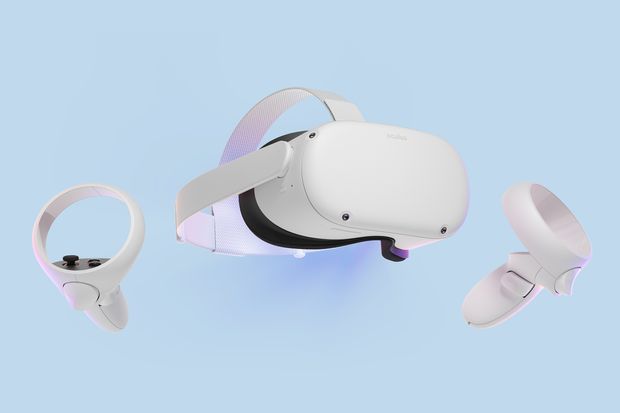Text size

Oculus Quest 2 with controllers
Courtesy of Facebook
Facebook
CEO Mark Zuckerberg outlined his vision for the company’s so-called augmented reality efforts at a company conference Wednesday, promising that his company now sees a path toward a viable product and will launch a first step next year.
The first product along the way, a set of smart glasses, is set to derive from a deal Facebook (ticker: FB) has signed with Ray-Ban maker
EssilorLuxottica
(ESLOY). The company, however, handed out no further details other than the launch time frame. The glasses won’t be augmented-reality capable themselves, a technology that promises to superimpose images on the world when viewed through a capable device.
In a prerecorded video at Facebook’s Connect conference, Zuckerberg said the company now has a “clear line of sight” for augmented reality products.
Facebook touted the eventual capabilities of augmented reality devices, claiming that they will one day translate foreign text in real time, provide directions, and project holograms of people in lieu of videoconferences. CEO Mark Zuckerberg also said the company had developed several augmented reality devices it plans to use to research the necessary capabilities.
The Menlo Park, California-based company isn’t the only Silicon Valley tech titan racing toward some kind of augmented reality hardware.
Apple
(AAPL) has made a significant bet on the technology too, though it hasn’t yet made clear what its ultimate hardware goals will be beyond its various existing mobile gadgets.
Facebook also announced the widely anticipated second generation of its stand-alone Oculus Quest hardware. The unit will include a Snapdragon XR2 chip made by
Qualcomm
(QCOM), a higher resolution display, and improved controllers, among other features.
The new Quest 2 will launch Oct. 13 and retail for $299, which is $100 less than the company’s first version. Unlike the various versions of Oculus Rift, the Quest doesn’t need to be connected to a powerful videogame computer to function, though the capability exists to do so.
Shares of Facebook declined 2.3% to $266.17 after The Wall Street Journal reported that the U.S. Federal Trade Commission was considering an antitrust suit against the company. Qualcomm shares dipped less than 0.1% to $116.55 in Wednesday trading.
Write to Max A. Cherney at [email protected]